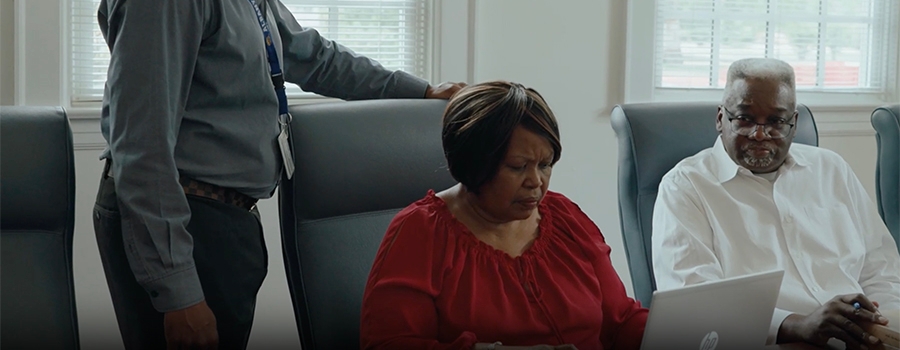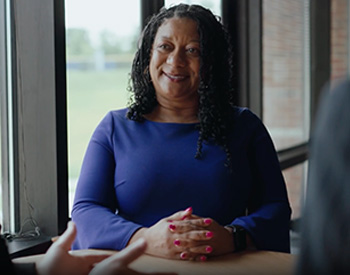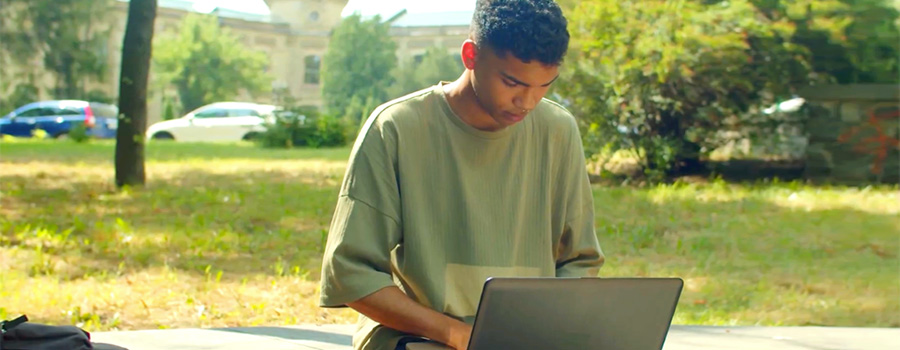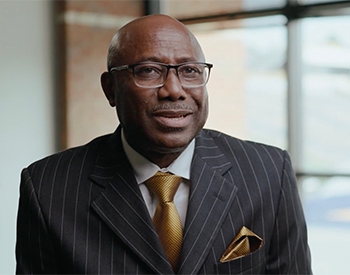Located in Southwest Georgia, Albany State University (ASU) is a top-ranked HBCU (Historically Black College or University) and the region's only large public higher education institution, serving nearly 7,000 students throughout the surrounding rural community. Founded in 1903, ASU has a rich history of championing academic excellence, social change and economic impact.
To better serve its local community while expanding its reach nationwide, the university launched a new online division in 2024 called ASURams Global, a new strategic unit dedicated to elevating the university's online learning and continuing education initiatives.
As the Executive Director of ASURams Global, Dr. Jean-Jacques Medastin brings more than two decades of experience in distance learning inspired by a personal passion for providing opportunities to underserved communities, like his native Haiti. Dr. Medastin and his colleagues are on a mission to improve access to quality education for people who can't make it to the campus to attend classes in person.
"People who live in rural communities, who are nontraditional students or who are busy with work should still be able to further their education. We provide access to that, so they can get the education they need to gain new skills based on their schedule," Dr. Medastin said.
Digital access, however, was a barrier to remote learning in ASU's community.

Overcoming the challenges of rural learners
For many ASU students, college isn't their only responsibility. They often already have full-time jobs, are single parents with toddlers or are working at locations in the community. This reality meant ASU's traditional education programs requiring in-class attendance no longer met the needs of many of its students.
But online learning in this region comes with its own challenges. ASU serves a rural community where broadband access is spotty at best, and many would-be online students lack access to the technology needed to complete coursework. Students without laptops or reliable internet access struggle to complete assignments on their phones, while some community members lack digital literacy.
"Some of our community members can barely afford electricity, let alone the internet," said Dr. Medastin. "They lack devices and the ability to use them to make distance learning work. We are aware of these challenges, and so, we are doing everything we can to help them get a better education."


We serve one of the poorest areas in the nation. This program could change the trajectory of someone's life forever.
Dr. Rhonda Porter, Interim Provost and Vice President of Academic Affairs
Connected laptops bring education home
To help solve this digital learning challenge, ASU partnered with Verizon to provide 300 HP ProBook 440 laptops free of charge to students and community members. Each laptop is equipped with a built-in SIM card that can access Verizon's network to deliver secure, always-on internet access. By embedding connectivity into a powerful laptop, users can work, study and access digital services from anywhere with no need for other Wi-Fi or wired access.
"The reason we chose Verizon is because we'd heard of Verizon's strong commitment to bridging the digital divide and their proven record for providing reliable connectivity," said Dr. Medastin. "Their support aligns with our mission, and their extensive resources enabled us to better implement our programs to ensure that the communities we serve receive the best support possible."
Thanks to the digital inclusion partnership with Verizon, ASU has equipped hundreds of students with connected devices that enable them to learn, work and access services from anywhere. The connected laptop initiative has already started making a meaningful difference in the lives of ASU students and community members across Southwest Georgia.
"We had one recipient who used to walk two miles a day to the library to access the internet," said Dr. Doug Allen, Program Manager for ASURams Global. "We were able to give her both a laptop and her time back."


We had one recipient who used to walk two miles a day to the library to access the internet. We were able to give her both a laptop and her time back.
Dr. Doug Allen, Program Manager, ASURams Global
Building a brighter future for students, the community and the university
The digital inclusion initiative was part of an overall investment in expanding and strengthening the university's online curriculum, ensuring the community can access high-quality, accredited classes from anywhere.
As a community-focused university, ASU wanted to provide devices to deserving community members in addition to students. Working through local churches, schools and community organizations, the university identified individuals and families in need, going beyond university students to also include high school students and other community members.
"The biggest challenge to bringing connectivity and digital training to the community wasn't just technology, but the fact that people thought what we had to offer was too good to be true," said Dr. Medastin. "We engaged with leaders who know their community to help us understand their needs, connect with people and help them understand that, yes, this is for real."
As part of the program, ASU launched cybersecurity and digital literacy programs to equip learners of all ages with practical skills for daily life and the workforce. These sessions were tailored based on real community feedback gathered through focus groups.
"We asked them, 'What do you want to use the internet for?'" said Dr. Allen. "For many users, it was, 'I want to do online bill pay, and I want to figure out how to shop online.' We did a lot of cybersecurity training to help people protect themselves in those situations."
The program has opened new doors for ASU. By expanding its online curriculum through ASURams Global, the university can now serve learners outside the region. "If we can grow online, we can reach national and global students who can get degrees online, allowing us to increase enrollment," said Dr. Rhonda Porter, Interim Provost and Vice President of Academic Affairs.
ASU leaders believe the impact of the initiative is just beginning. "We serve one of the poorest areas in the nation. This program could change the trajectory of someone's life forever," said Dr. Porter. "With these resources, they can go to college, work remotely or make it possible for their family members to get online. It's giving these recipients and their families the same resources as others—it gives them equal access."

The reason we chose Verizon is because we'd heard of Verizon's strong commitment to bridging the digital divide and their proven record for providing reliable connectivity.
Dr. Jean-Jacques Medastin, Executive Director, ASURams Global
Learn more
Technology for distance learning
With the right collaboration and communication tools, administrators can help teachers and students remain engaged and connected.